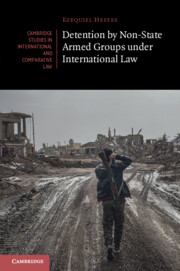Book contents
- Detention by Non-State Armed Groups under International Law
- Cambridge Studies in International and Comparative Law: 166
- Detention by Non-State Armed Groups under International Law
- Copyright page
- Contents
- Foreword
- Acknowledgements
- Cases
- Documents and Resolutions
- Introduction
- Part I Non-State Armed Groups and International Law
- Part II Non-State Armed Groups, Motives, Legal Basis and Organisation
- 3 Detention in Non-international Armed Conflicts
- 4 To Detain, or Not to Detain
- General Conclusion
- Bibliography
- Index
- Cambridge Studies in International and Comparative LawBooks in the Series
4 - To Detain, or Not to Detain
An Inquiry into Non-State Armed Groups’ Practices in Non-international Armed Conflicts
from Part II - Non-State Armed Groups, Motives, Legal Basis and Organisation
Published online by Cambridge University Press: 27 January 2022
- Detention by Non-State Armed Groups under International Law
- Cambridge Studies in International and Comparative Law: 166
- Detention by Non-State Armed Groups under International Law
- Copyright page
- Contents
- Foreword
- Acknowledgements
- Cases
- Documents and Resolutions
- Introduction
- Part I Non-State Armed Groups and International Law
- Part II Non-State Armed Groups, Motives, Legal Basis and Organisation
- 3 Detention in Non-international Armed Conflicts
- 4 To Detain, or Not to Detain
- General Conclusion
- Bibliography
- Index
- Cambridge Studies in International and Comparative LawBooks in the Series
Summary
Building on findings presented earlier in this book, this chapter has a two-fold aim. First, it explores the reasons why non-State armed groups (NSAGs) actually detain, challenging some common misconceptions about how these entities operate in conflict settings, and suggesting new lines of inquiry. Second, it considers these findings and discusses the legal grounds necessary for these non-State actors to deprive individuals of their liberty in conflict settings or, to put it differently, to ensure that the actions of NSAGs in this regard are not manifestly unlawful. This chapter (and the book more broadly) is of the view that NSAGs need to enact their own normative authority to guarantee the respect of individuals’ safeguards, including the principle of legality. Given the lack of an explicit legal basis to deprive individuals of their liberty in international law, in particular in treaty and customary international humanitarian law, it is submitted that NSAGs’ ‘laws’ and regulations, which result from their law-making (or law-adapting) activities, are the only legal tools that may actually serve for this purpose.
- Type
- Chapter
- Information
- Detention by Non-State Armed Groups under International Law , pp. 187 - 237Publisher: Cambridge University PressPrint publication year: 2022

